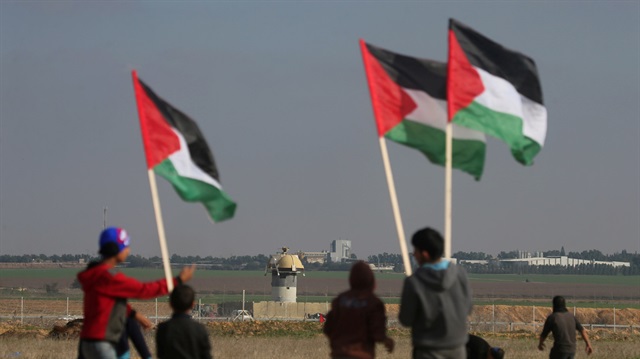
Hassassian says Palestinians have engaged with a “futile” peace process in the last 25 years
The Palestinian-Israeli conflict is the cause of all problems in the Middle East region and there can be no peace without solving it, the Palestinian Authority's diplomatic representative to Britain said.
Speaking to Anadolu Agency at a conference on Jerusalem in London, Manuel Hassassian said the U.S. lost its status as a trustworthy peace broker after President Donald Trump’s decision to recognize Jerusalem as the capital of Israel.
“The international community should understand that the Palestinian-Israeli conflict is the cracks of all problems in the Middle East and without solving them there will never be a regional peace and security,” Hassassian said.
He described Trump’s unilateral move to recognize Jerusalem as Israel’s capital as a “breach” of international law and the status quo.
“America has decided to be on the wrong side of the history by imposing a solution as a third party,” he said.
“America lost its privilege of being an honest peace broker and it has discredited itself as a third party. Therefore the Palestinian Authority made it quite clear that Americans cannot really continue with the peace process while they are totally and unequivocally supporting Israel.”
Trump's decision has triggered world outcry and protests in the Palestinian territories that left dozens of Palestinians dead.
Jerusalem remains at the heart of the decades-long Palestinian-Israeli conflict, with Palestinians hoping that East Jerusalem -- now occupied by Israel -- might eventually serve as capital of an independent Palestinian state.
Hassassian said the Palestinians have engaged with a “futile” peace process that brought them nothing but “more settlements and more Judaization of Jerusalem” in the last 25 years.
He said the Palestinians will now look for a new approach to the entire peace process as the U.S. has “discredited itself” as a third party.
“Our alternative plan is to go back to the international legal system, to the international law, to UN Security Council resolutions concerning Jerusalem and the entire peace process. And that’s why now we are trying to look for a substitute as a gavel holder to the peace process and that substitute to be a conglomerate of international body that is comprised of the five permanent [members of the UN] Security Council plus the representatives from the EU, Arab world, let alone the Islamic world.”
“It is like the style of Iran 5 1,” Hassassian described the third party they are now looking for to continue the peace process.
That’s why, he explained, Palestinian President Mahmoud Abbas is looking for support in his visits.
“Jerusalem is the heart of Palestine and it is the eternal capital of the Palestinians,” Hassassian stressed.
A new step to be taken to leave behind the impasse reached in Palestinian-Israeli conflict could be the international recognition of the Palestinian state, according to Kevin Chamberlain, a former legal adviser to British Foreign Office and the Palestinian Authority.
Speaking to Anadolu Agency, Chamberlain said some steps toward the recognition of a Palestinian state have been taken as it has become a full member of the UNESCO.
“I am sure if the issue came up before the general assembly of the UN, there might well be a majority for that. But the problem with that is where do you go from there? Because without any practical way of realizing that statehood would be meaningless,” he said.
“The problem is with the Israeli settlements. The viability of the Palestinian state is getting more and more difficult and of course, the international community regards the establishment of these settlements as a breach of the 4th Geneva Convention and illegal. But Israel has not appeared to take any heed of that.”
Sami Abu Shehadeh, chief executive officer of the Yaffa Youth Movement, said many people from the Palestinian academics are going back to the public scene to “rethink about the Palestinian national project.”
“There is something that should change,” Shehadeh told Anadolu Agency.
“Is it leading to a serious political project? We don’t know but we know that there are a lot of movement and conferences and everybody is talking about it.”
Abu Shehadeh said he believes that there isn’t much to do in the current situation.
“Much before [Trump’s] announcement, Gaza has been suffering a decade of blockade. People cannot live normally in Gaza. They can’t have clean water in Gaza. They can’t eat normal food in Gaza. And nobody cares.”
Shehadeh said he does not believe there is much to do in the next few years but “what we can do is to build a young leadership for the Palestinian people who believes in the rights of Palestinians.”
Shehadeh also underlined the necessity of a common and united vision to reach a solution for the Palestinians.



